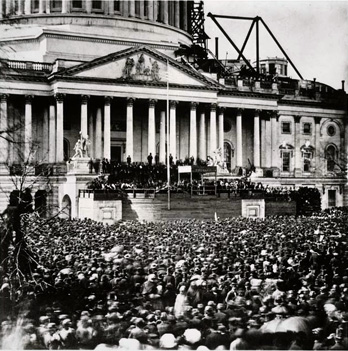![]()
|
Lincoln's inaugural address was aimed at allaying Southern fears. His opening words were, "I have no purpose, directly or indirectly, to interfere with the institution of slavery in the states where it exists. I believe I have no lawful right to do so, and I have no inclination to do so." But he flatly rejected the right of any state to secede from the Union, and he announced that he would "hold, occupy, and possess" the property and places belonging to the federal government. Such a threat was necessary because the rebellious states had already seized federal forts, arsenals and customhouses within their boundaries. Even with this threat, Lincoln's tone was moderate. "The government will not assail you," he addressed the South. "You can have no conflict, without being yourselves the aggressors. You have no oath registered in Heaven to destroy the government, while I shall have the most solemn one to 'preserve, protect and defend' it." |

|
|
|
Photograph: Library of Congress.
Bibliography: Fehrenbacher, Don E. Prelude to Greatness
(1962; repr. 1970) and, as compiler, The Leadership of Abraham
Lincoln (1970), and Abraham Lincoln: Speeches and Writings,
2 vols. (1989).